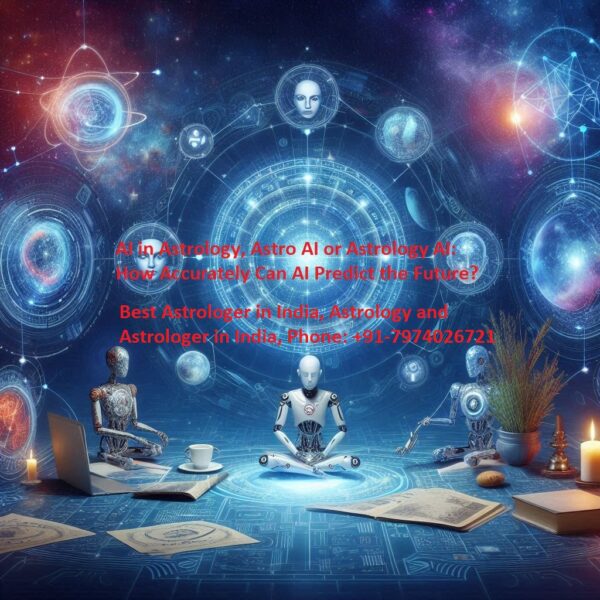AI in Astrology, Astro AI or Astrology AI: How Accurately Can AI Predict the Future?

AI’s integration into astrology, often referred to as Astro AI or Astrology AI, is an emerging field that combines traditional astrological practices with advanced artificial intelligence technologies. This intersection raises intriguing questions about the accuracy and reliability of AI in predicting future events based on astrological principles.
Understanding Astro AI
Astro AI utilizes machine learning algorithms, natural language processing, and vast databases of astrological data to generate insights and predictions. By analyzing patterns in celestial movements alongside user data (such as birth charts), AI can provide personalized astrological readings. This approach aims to enhance the traditional methods of astrology by offering a more data-driven perspective.
Accuracy of AI Predictions in Astrology
The accuracy of AI in predicting the future through astrology is a complex topic. While AI can process large amounts of data and identify patterns that may not be immediately apparent to human astrologers, several factors influence its effectiveness:
- Data Quality: The accuracy of predictions heavily depends on the quality and comprehensiveness of the data fed into the AI models. If the underlying astrological data is flawed or incomplete, the predictions will likely be unreliable.
- Algorithm Design: The algorithms used to interpret astrological data must be sophisticated enough to account for the nuances of astrology, which often involves subjective interpretation. Current machine learning models can struggle with this complexity, potentially oversimplifying intricate astrological concepts.
- User Input: Personalized predictions require accurate user input (e.g., birth date, time, and location). Any inaccuracies in this information can lead to erroneous predictions.
- Interpretative Nature of Astrology: Astrology is inherently interpretative, relying on symbolic meanings that can vary among practitioners. AI may lack the intuitive understanding that experienced astrologers possess, which can limit its predictive capabilities.
Current Applications and Limitations
Astrology apps powered by AI are becoming increasingly popular, providing users with daily horoscopes, compatibility analyses, and personalized readings. However, these applications often serve more as entertainment rather than serious predictive tools. Users should approach these insights with caution, recognizing that while AI can enhance traditional astrology practices, it cannot replace the nuanced understanding of a skilled astrologer.
Limitations include:
- Lack of Emotional Intelligence: AI lacks the ability to empathize or understand human emotions deeply, which are often crucial in astrological readings.
- Generalization: Many AI systems may generalize findings across large datasets without accounting for individual differences.
- Ethical Considerations: The use of personal data raises privacy concerns and ethical implications regarding consent and data security.
AI in astrology presents an innovative blend of technology and ancient wisdom, offering new tools for exploration within this mystical field. However, while Astro AI can assist in generating insights based on astrological principles, its accuracy in predicting the future remains limited by data quality, algorithmic design, and the interpretative nature of astrology itself. As this technology evolves, ongoing research and development will be essential to enhance its reliability and effectiveness in delivering meaningful astrological predictions.
The idea of using AI in astrology—sometimes referred to as Astro AI or Astrology AI—combines advanced data analytics, pattern recognition, and computational modeling to interpret astrological principles and potentially predict trends or behaviors. However, understanding its accuracy requires separating the technical capabilities of AI from the philosophical and methodological aspects of astrology.
How AI Enhances Astrology
- Data Processing:
- AI can process massive datasets of planetary movements, historical events, and personal birth charts faster than any human astrologer.
- Machine learning models can identify patterns in astrological data that align with historical trends or behavioral outcomes.
- Pattern Recognition:
- AI can correlate celestial alignments with events in a way that is free from human bias.
- Tools like natural language processing (NLP) can help AI analyze astrological texts, predictions, and interpretations for deeper insights.
- Personalized Readings:
- AI tools, like apps or platforms (e.g., Co-Star, The Pattern), provide users with detailed birth chart analyses and daily horoscope updates.
- These systems offer tailored advice by combining astrological rules with personal data, such as zodiac signs, houses, and planetary aspects.
- Predictive Analytics:
- While traditional astrology relies on the interpretation of planetary cycles, AI can incorporate statistical techniques to evaluate probabilities of future trends.
Limitations of Astrology AI
- Astrology’s Philosophical Nature:
- Astrology is not strictly a scientific discipline. Its predictions are based on symbolic relationships and archetypes, not empirically proven cause-effect mechanisms.
- AI operates best when there are concrete, measurable outcomes, which astrology often lacks.
- Generalization vs. Individual Context:
- AI predictions are often generalized based on past data, but astrology claims to offer personalized guidance based on the unique alignment of celestial bodies at an individual’s birth.
- Interpretation Complexity:
- Astrological symbols and aspects can be interpreted in multiple ways depending on context. AI, unless trained extensively on these nuances, might oversimplify or misinterpret these symbols.
- Predictive Accuracy:
- AI models rely on historical data patterns for predictions, but astrology inherently involves subjective interpretations that can’t always be quantified or verified.
Can AI Predict the Future Accurately Using Astrology?
- Limited to Patterns and Probabilities: AI in astrology can highlight potential trends and suggest probabilities but cannot definitively predict the future. It works well for identifying correlations, not causation.
- Dependence on Data: For AI to “predict” the future accurately, it needs vast amounts of quality data. However, astrology often deals with symbolic and intangible elements that resist quantification.
- Augmentation, Not Replacement: AI can assist astrologers by handling calculations and data-driven insights, but human intuition and interpretative skill remain crucial for meaningful astrological predictions.
Practical Applications of Astro AI
- Personal Guidance:
- AI-based astrology apps provide personalized daily or monthly forecasts, using algorithms trained on astrological principles.
- Market Trends:
- Financial astrology apps aim to analyze market behavior based on planetary movements, though these are speculative at best.
- Relationship Compatibility:
- AI can assess astrological compatibility by analyzing natal charts to suggest potential harmony or challenges.
AI in astrology is an impressive tool for pattern recognition and trend analysis, but it cannot definitively predict the future. It excels in supporting human astrologers, offering efficiency, and providing insights drawn from vast datasets. However, its effectiveness in astrology is constrained by the inherently interpretive, symbolic, and subjective nature of astrological practice.
AI in Astrology
- What it is: The application of artificial intelligence techniques to analyze astrological data and generate predictions.
How it works: AI models are trained on vast amounts of historical astrological data, birth charts, and predictions. They learn to recognize patterns and correlations between celestial events and human experiences.
- Benefits:
- Speed: AI can generate predictions much faster than human astrologers.
Objectivity: AI removes human biases and emotions from the prediction process.
- Scalability: AI-powered astrology tools can serve a large number of users simultaneously.
- Speed: AI can generate predictions much faster than human astrologers.
Accuracy of AI Predictions
- Limited by the nature of astrology: Astrology itself is not a scientifically proven method for predicting the future. AI, while powerful, cannot overcome the inherent limitations of its underlying principles.
- Dependent on data quality: The accuracy of AI predictions relies heavily on the quality and quantity of the data used for training.
- Best for general trends: AI is better suited for making general predictions about trends and probabilities rather than specific, personalized forecasts.
Terminology
- Astro AI: A combination of “astrology” and “AI,” referring to the field of using AI in astrology.
- Astrology AI: Another way to refer to the same concept, emphasizing the use of AI for astrological purposes.
AI can enhance the efficiency and objectivity of astrological analysis, but it cannot guarantee accurate predictions of the future. It’s best used as a tool for gaining insights and exploring possibilities, rather than a definitive guide to one’s destiny.
Pandit Ajay Gautam is more than just an astrologer; he is a spiritual guide, a counselor, and a friend. His profound knowledge, compassionate approach, and accurate predictions have made him a beacon of hope for countless individuals seeking guidance and clarity. As he continues to illuminate the path of his clients, his legacy as one of India’s finest astrologers is sure to endure for generations to come.
Best Astrologer in India, Astrology and Astrologer in India
Pandit Ajay Gautam
Best Astrologer Number Phone: +91-7974026721
Best Astrologer Number, Astrology and Astrologer in India, Pandit Ajay Gautam
Best Astrologer in India, Astrology and Astrologer in India, Best Astrologer Contact Number, Online Astrologer Contact Number, Best Astrologer Number Phone: +91-7974026721
Best Astrologer in India, Astrology and Astrologer in India, Pandit Ajay Gautam
